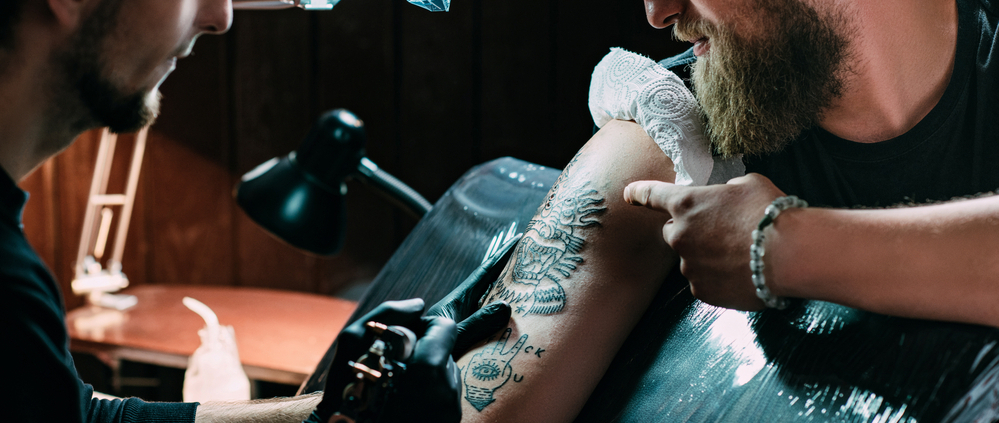Tattoo Aftercare: Tips and Tricks for People With Sensitive Skin
There’s nothing like the feel of a fresh tattoo. When we say that, we refer to both the good parts and the bad. Undoubtedly, fresh ink will come with a small amount of pain and discomfort. Normally, this isn’t much of a problem, but those with sensitive skin can sometimes experience more unpleasant side effects. So, do people with sensitive skin have to avoid tattoos? Not necessarily. Here are a few tips and tricks that will help all you sensitive-skinned types to bear your ink with less trouble.
How To Know If You Have Sensitive Skin
It’s important to understand your skin type before you get a tattoo. We have heard many stories from people who failed to account for this factor. In some cases, this can result in improper aftercare, which can ruin a good piece of work.
In general, you should think about how often you tend to develop skin irritations. Many skin irritations result in soreness and redness and these are easy to recognize. However, excessive flaking and peeling of the skin is also an indicator of sensitivity. If you do a lot of peeling and flaking, your skin is probably on the sensitive side. Acne and rosacea are also signs that you need to be more careful.
In some cases, sensitive skin is the result of allergies. Unlike most cases, allergy-related skin issues can be diagnose with a simple micro-exposure test. Basically, they expose you to a tiny amount of a suspected allergen so that they can look for a reaction.
Problems That Can Arise
No matter how small the needle, tattooing is a little bit rough on the skin. As such, it can cause some people to break out in hives, rashes, etc. Dry skin will itch quite a bit while recovering from a tattoo as well. When you are still wearing the bandage/wrap, this is a maddeningly irritating thing.
In essence, sensitive skin doesn’t really create new problems as much as it magnifies all the common ones. For instance, some people have been known to have allergic reactions to certain types of ink. If your skin is a little less hardy, the resulting breakout will be a lot worse. Skin breakouts are often accompanied by oozing of pus or other nasty infectious substances. When this kind of corruption gets into a fresh tattoo, it can turn a minor problem into a major one.
View this post on Instagram
Tips For Proper Sensitive-Skin Aftercare
Now that you understand the problem, let’s get to the important part. One good thing is the fact that sensitive-skinned individuals can still get tattoos. Apart from the most extreme cases, these people will just have to take closer care of their inkwork as it heals. Within 2-3 weeks, you should be back to normal.
1: Hydrate Well
First of all, you should drink plenty of water in the days and hours leading up to your inking session. When the body is better-hydrated, the skin will also be more hydrated. This will result in less peeling, flaking, and overall inflammation. If you have doubts about this, you might be pleased to know that we have done the research. This study found that drinking more than 2 liters of water per day had a positive effect on skin thickness. The effect wasn’t all that large, but this was only a 4-week study.
2. Don’t Leave The Bandage On For Too Long
Most artists will advise you to remove the wrap/bandage after a couple of hours. Just to be on the safe side, some people will choose to leave them on much longer. This isn’t a bad option for most people, but a person with less hardy skin shouldn’t overdo things.
The problem is that bacteria and other nasty things can grow better in a dark, damp, and secluded environment. This is why you don’t normally see mold and fungus in well-ventilated areas. So, you should probably remove that bandage as soon as possible. Clean it very frequently throughout the first day to compensate for the lack of a covering. Loose clothing is a good thing to employ here, as those woven surfaces can also harbor microscopic nastiness.
3. Employ A Tattoo Moisturizer
There are a number of products that offer sterile moisturizing products. When used for tattooing, a moisturizer must be free of anything that might contaminate an open wound. As such, you can’t just use whatever you have on hand. One thing you can do is to look for a moisturizer that is made from fatty alcohols (cetearyl alcohol is the most common). Your artist should be able to recommend a good product for this purpose.
4. Don’t Pick Or Scratch At The Tattoo
As your mother probably told you, picking at scabs will only make them worse. It’s normal for tattoos to cause a certain amount of scabbing, so it’s not really a big problem. However, if you try to pull those scabs off, you may end up pulling out some of the ink as well. Those little scabby things will eventually heal underneath and fall off as they dry. A person with sensitive skin will be more tempted to scratch and dig, but you must resist the urge to avoid skin inflammation and longer healing times.
5. Do Not Go Swimming!
This should go without saying, but you should not go swimming until your tattoo has fully healed. Swimming pools (especially the public ones) are absolutely full of bacteria and germs. Of course, this usually isn’t a problem unless you have an open wound. Even a private backyard pool will not be completely sterile. Showers are fine, but keep them short and don’t use very hot water.
Conclusion
In general, people with milder skin will have to take care of their new tattoo a little more closely. It will need more frequent cleaning and attention, but it isn’t really that hard. At this point, you might be wondering: “What are the best local tattoo shops near me?” Instead of calling twenty different Philadelphia tattoo shops, you can call Oracle Tattoo Gallery at 215-638-1601.



